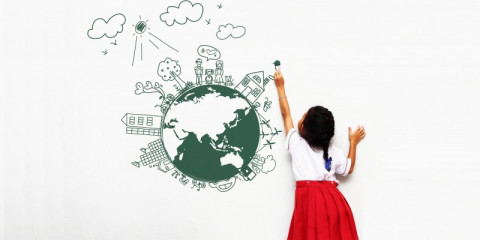
GCED Basic Search Form
Quick Search
현재 위치
뉴스

UNESCO Bangkok analyzed the extent to which learning contents related to concepts, values and behaviours relevant to SDG Target 4.7 were included in the eighth grade curricula of 13 countries in Asia.1 The subjects of the examined curricula included mathematics, national language, science and social studies.2 The data were sourced from a study undertaken in 2016-2017 by the Mahatma Gandhi Institute of Education for Peace and Sustainable Development (MGIEP), in which independent consultants were asked to analyze the frequency of the appearance of SDG 4.7-related words and phrases in the curricular documents of each country, using a common coding scheme.3 The coding was organized by categories of topics and key words relevant to SDG 4.7.
The data obtained from 13 countries were used for the charts presented below. Each dot represents the number of times that a category appears per 100 pages in the curricular documents of a country. The yellow bar represents the average of frequency counts for all countries in the respective category.
Concepts Related to SDG 4.7
Concepts related to 'environmental sustainability', 'human rights' and 'interconnectedness' are addressed most often in the curricula of the 13 countries. References to ‘good health and well-being’ are also made with significant frequency in three countries. On the other hand, concepts related to ‘gender equality’, ‘global issues’ and ‘global systems, structures and processes’ are hardly present in the curricula, suggesting the particular need to strengthen education for gender equality and Global Citizenship Education in the region.

Values Related to SDG 4.7
Among the values that the countries’ curricula refer to most are 'nation as privileged referent of identity', ‘solidarity, global solidarity, common humanity’, and 'attitudes of care, empathy, dialogue, respect and compassion'. In two countries, national identity seems to be highlighted in particular. Strong emphases seem to be placed on values related to ‘solidarity, global solidarity, common humanity’ in one country. Values related to ‘curiosity’, ‘tolerance’, ‘resilience’, ‘diversity’, and ‘justice’ are also present though not at a high level, indicating that most countries consider them moderately important. On the other hand, many countries’ curricula seem to pay little attention to values related to ‘democratic participation’, ‘self-awareness’, and ‘anti-discrimination/anti-racism’. There is no reference made to ‘democratic participation’ in nine countries, and to ‘anti-discrimination/anti-racism’ in eleven countries.

Behaviours Related to SDG 4.7
Overall, fewer references are made to 4.7-related behaviours in the curricula. The most frequently mentioned category is ‘participation and active citizenship or civic engagement’, suggesting that social participation is encouraged in many countries. Discussions around ‘environmentally sustainable lifestyles’ and ‘social-ethically responsible consumers’ also seem to be included in the curricula of most countries. On the other hand, many countries do not seem to be interested in encouraging ‘engagement in debates on socio-political issues’, ‘current future participation in civic protest’, and ‘direct action on issues of global reach’. In fact, no country’s curricula refer to ‘direct action on issues of global reach’, implying, as found in the analysis of 4.7-related concepts, the need to accelerate and strengthen the promotion of Global Citizenship Education in the region.

This information note was prepared for the Third Asia-Pacific Meeting on Education 2030 (APMEDIII), held between 4 and 7 July 2017 in Bangkok, Thailand. For inquiries, please contact esd.bgk@unesco.org.
URL:
https://bangkok.unesco.org/index.php/content/sdg-47-contents-curricula-13-countries-asia
